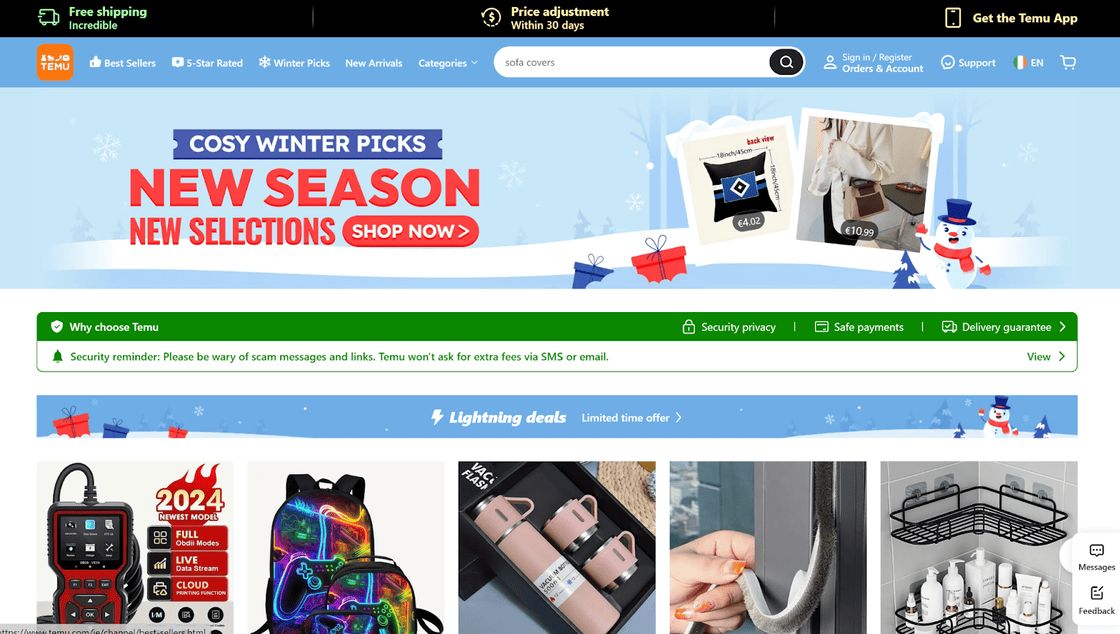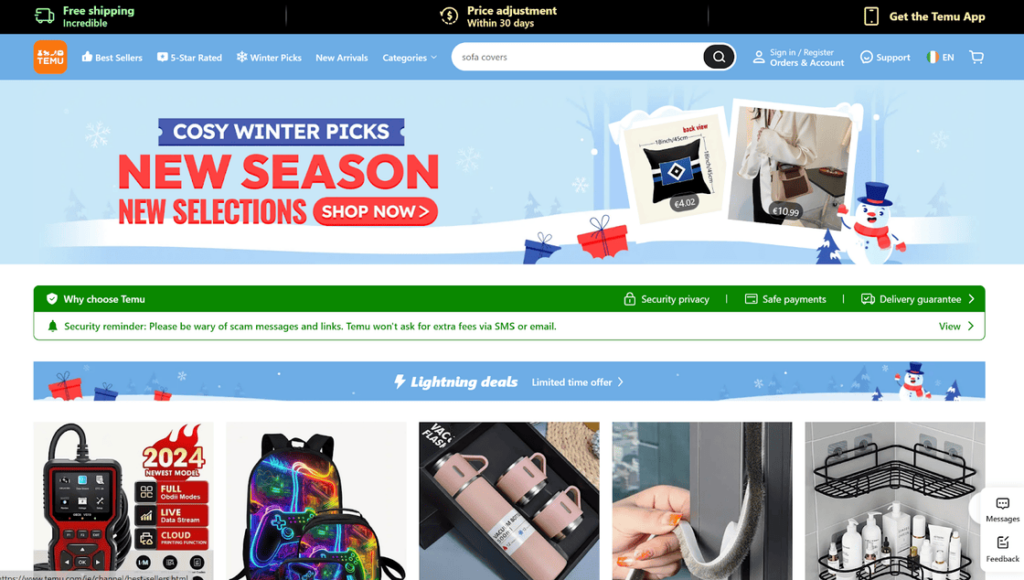Is Temu a Scam?
Laura Martisiute
Reading time: 7 minutes

Table of Contents
If you’re thinking of shopping on Temu, you need to know: Is Temu a scam?
Below, we explain whether Temu is a scam and discuss some steps you can take to improve your safety when shopping on this online platform.
What Is Temu?
Temu is an online shopping platform that launched in the United States in 2022.

It is similar to sites like Amazon, AliExpress, or Wish in that it is a direct-to-consumer marketplace that connects consumers with a wide range of products (electronics, clothing, home goods, etc.), often sourced directly from manufacturers or wholesalers.
The platform offers competitive pricing, discounts, and flash sales and is known for the marketing slogan, “Shop like a billionaire.”
Customers can browse products by category, read other customers’ reviews, and make purchases through the Temu app or website.
It is owned by PDD Holdings, the same parent company behind the Chinese e-commerce giant Pinduoduo.
Is Temu a Scam?
No, Temu is not a scam.
It is a legitimate shopping platform owned by PDD Holdings, the parent company of Pinduoduo, an e-commerce platform, and operates similarly to other reputable online marketplaces, such as Amazon, AliExpress, or Wish.
This is confirmed by organizations that promote informed consumer choices, like the UK-based Which?
Varied shopping experiences
However, just because Temu is not technically a scam doesn’t necessarily mean you’ll have a good shopping experience.
At the time of writing, Temu is not Better Business Bureau (BBB) accredited and receives a -B rating on the BBB site. There have been thousands of complaints filed against Temu.
As with any large online marketplace, your experience will vary depending on a host of factors, such as product quality, seller reliability, and shipping times.
Since there are many different sellers on Temu, the quality and authenticity of products can vary hugely. Some items can be of lower quality than advertised or not match your expectations. Testing by Which? found that some items (like electric heaters and toys) did not meet safety standards, posing potential risks.
Many products are shipped internationally, so there can be longer shipping times, customs delays, or issues with tracking.
Which? also questions the transparency of Temu’s pricing strategies, saying that although each product they saw was discounted, it wasn’t clear for how long it was at the discounted price or how long it was at the “was” price.
Overall, user experiences on Temu seem to vary.
Some users praise the platform for its massive selection of affordable products.

Others warn about inconsistent quality, long shipping times, incompetent customer service, and refunds that never materialize.

Temu security measures
Temu describes its security measures in its support center.
The platform says it protects customers’ payment data by:
- Working with major payment providers (Mastercard, Visa, PayPal, etc.) with stringent consumer protection policies and security tech.
- Using advanced security measures like secure socket layer (SSL) technology to encrypt data during transmission to protect data.
- Complying with the Payment Card Industry Data Security Standard (PCI DSS).
- Conducting regular security audits.
According to Temu, they “rigorously verify all merchandise partners on Temu to maintain a safe and trustworthy shopping website.”
Temu also has return and refund policies. Customers can return/refund items within 90 days of purchasing them (not receiving them). Once you submit a return request, you need to return the package within 14 days.
Once they issue a refund, Temu says it can take between 5-14 business days (up to 30 days) for the refund to arrive depending on your financial institution.
Forced labor accusations
According to US lawmakers, there is an “extremely high risk” that items sold on Temu and other Chinese online shopping sites are made using forced labor.
A report from the House Select Committee on the Chinese Communist Party stated:
“Temu does not have any system to ensure compliance with the Uyghur Forced Labor Prevention Act (UFLPA). This all but guarantees that shipments from Temu containing products made with forced labor are entering the United States on a regular basis, in violation of the UFLPA.”
Stolen designs
Temu has been accused of being filled with unauthorized replicas or knockoffs of popular products or products from independent brands.

For example, PCMag said they saw designer knockoffs like the Mini Glossy Solid Color Shoulder Bag, an imitation (and probably a copyright violation) of Jacquemus’ Le Chiquito Moyen bag, on Temu.
In 2024, Shein sued Temu for design theft.
Privacy concerns
The platform has also been criticized for its privacy practices, with some reports labeling the app as spyware that collects extensive user data without clear consent. This criticism isn’t isolated; concerns were also raised about its sister app, Pinduoduo, which reportedly:
- Escalated its access to user data without notification.
- Prevented itself from being uninstalled.
- Tracked activity on other shopping apps.
Following these revelations, Pinduoduo allegedly disbanded the team behind these practices, with some members moving to Temu in different roles.
In response to concerns about Chinese government interference, Temu’s parent company, PDD Holdings, moved its legal base to Ireland, and Temu relocated to Boston.
According to Temu’s privacy policy, the platform collects extensive user information, including data from third-party sources like social media and data brokers, building comprehensive user profiles.
Its privacy policy has been rated with a “Warning” by the Common Sense Privacy Program, indicating it doesn’t meet recommended privacy and security standards.
Although many apps collect large amounts of data, Temu has faced additional scrutiny due to allegations of facilitating Chinese government surveillance, misleading privacy labels, and a codebase that is particularly hard to analyze.
So, Should You Shop on Temu?
That depends on your own personal priorities regarding cost, quality, and privacy.
If you decide to shop with Temu, make sure to research products and sellers, safeguard your personal data, and manage your expectations regarding quality and service.
How to Use Temu Safely
Here are some tips for a safer experience while shopping on Temu.
- Use the Temu website rather than the app. Apps tend to be less privacy-friendly than websites, so if possible, use the Temu website.
- Mask your personal information. Temu receives additional data about customers from data brokers and other third parties, so try to share as little as possible with them from the get-go to make this additional data collection less fruitful. Use a masked email address, don’t upload a profile picture, etc.
- Watch out for Temu scams. Scammers are taking advantage of Temu’s popularity for their own benefit. Keep an eye out for phishing scams that pretend to come from Temu (you can forward these to reportphishing@temu.com), fake Temu gift card promotions on social media, and Temu affiliate link scams.
- Read the reviews. Always read seller reviews before you buy anything from Temu.
- Create a strong password. Don’t reuse any other passwords on Temu, and make sure your password is long and complex.
- Turn on 2FA. Enable Temu’s two-factor authentication (2FA). This way, even if someone else gets their hands on your password, they still won’t be able to log into your Temu account.
- Monitor your Temu account. Temu recommends that customers periodically check their accounts for any unauthorized activity. If you notice anything suspicious, report it immediately.
- Use a P.O. box. If you’d rather not share your address with Temu, you can always get your items delivered to a P.O. box.
Our privacy advisors:
- Continuously find and remove your sensitive data online
- Stop companies from selling your data – all year long
- Have removed 35M+ records
of personal data from the web
Save 10% on any individual and
family privacy plan
with code: BLOG10
news?
Don’t have the time?
DeleteMe is our premium privacy service that removes you from more than 750 data brokers like Whitepages, Spokeo, BeenVerified, plus many more.
Save 10% on DeleteMe when you use the code BLOG10.
















